UN Climate Talks Kick Off in Brazil
Air Date: Week of November 7, 2025
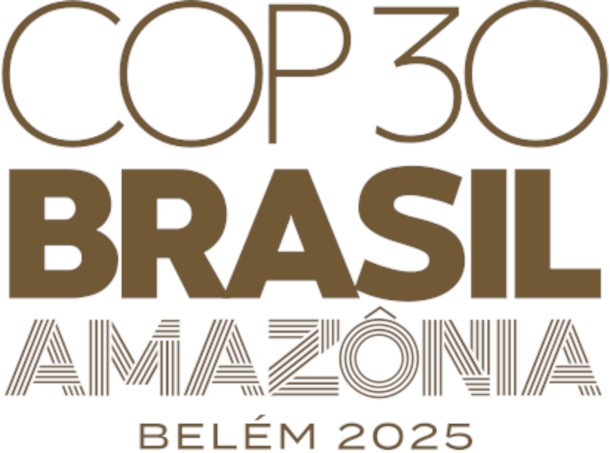
This year’s Conference of the Parties is being held in Belém, Brazil, from November 10th through 25th. An estimated 50,000 to 60,000 attendees are expected to arrive from around the world. (Photo: United Nations Framework Convention on Climate Change, Wikimedia Commons, Public Domain)
The biggest climate negotiations of the year, COP30, are kicking off in Belem in the Brazilian Amazon. Longtime COP observer Jennifer Morgan is a former executive director of Greenpeace and former state secretary and special climate envoy for Germany who is now a senior fellow at Tufts University. She joins Host Steve Curwood to preview COP30 and discuss the focus on closing the gap between current greenhouse gas reduction policies and what’s needed to limit warming to a safer level.
Transcript
DOERING: From PRX and the Jennifer and Ted Stanley studios at the University of Massachusetts Boston, this is Living on Earth. I’m Jenni Doering.
CURWOOD: And I’m Steve Curwood.
The biggest climate negotiations of the year are kicking off, with world leaders and climate experts from more than 190 countries coming to Belem in the Brazilian Amazon. COP30 is this year's conference of the parties to the UN Climate Treaty. And this gathering comes as the momentum of climate disruption grows with massive heat waves, wildfires, severe storms, floods, rising sea levels and melting polar regions. Joining us now is Jennifer Morgan, a former Executive Director of Greenpeace, and former State Secretary and Special Climate Envoy for Germany. She's now a Senior Fellow at Tufts University. Jennifer, COP 30 marks thirty years of these talks. How is this year's session? Is it both a moment of reflection of past work and a turning point of future progress, do you think?
MORGAN: I think it's both, I think the reflection is occurring as we speak, reports are coming out about, what is the difference from 10 years ago, whether it be in temperature rise that has been lowered, you know, the world was on track for a 7.2 degree Fahrenheit rise in temperature 10 years ago. Now, the UNEP report has just come out and said it's more like a four degree Fahrenheit rise in temperature. So there's been a decline, which is good, but not enough, of course. And I've heard a lot of people discussing what's been happening in the energy sector. I think 10 years on, things have happened that I certainly couldn't have imagined in Paris. You know, we are seeing solar capacity being deployed annually at 15 times what was predicted in 2015, we're seeing EVs, then it was one in 100 being sold. Now it's one in five cars being sold are electric vehicles. So I think it's important to reflect on that, but then to say, okay, how do we accelerate? We've got this positive foundation, countries are coming forward with their national plans, the institutions are working, but we're far off course of where we need to be. And I think that is the key topic at this COP is, how do we accelerate action? How do we close that gap where we know we need countries to be doing more, the private sector to be doing more in a way that drives economic prosperity and resilience and stability.
CURWOOD: Who are the key players at this year's Conference of the Parties, at this COP? Which countries or leaders should the public be watching here?
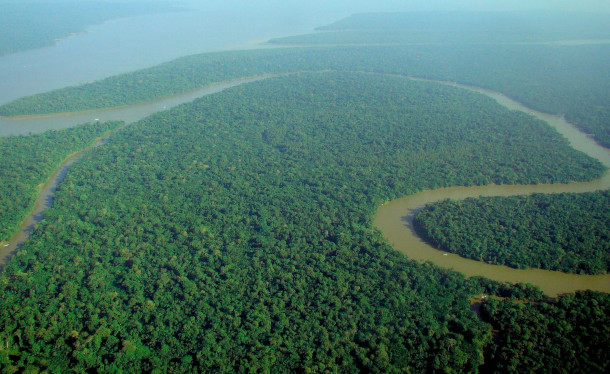
Brazil contains the largest portion of the Amazon rainforest, making biodiversity and deforestation control a keystone of this year’s COP. (Photo: lubasi, Wikimedia Commons, CC BY-SA 2.0)
MORGAN: Well, obviously Brazil. Brazil is the president of this COP, President Lula has been very engaged, and they are hosting this meeting in the Amazon. And Brazil has a very strong history of diplomatic successes. So I think how they pull this all together is absolutely fundamental, so watching what they are doing as a major emerging economy is key. China, also world's largest emitting country, also massive growth in green products moving forward, what role will they play? Will they step into the U.S.'s footsteps at all in perhaps more leadership with Chinese characteristics, what does that look like? The European Union working to integrate climate and decarbonization to become the world's first decarbonized, carbon neutral continent, they traditionally have played a leadership role working with developing countries. So it's always important to listen to what the small islands are saying, the least developed countries, we know they are on the front line, and so listening to the alliance of small island states, that's normally where I start. But then these other players need to come along, obviously as well.
CURWOOD: And by the way, Brazil is also now a major producer of oil, as well as having a big piece of the Amazon. How do those contradictions affect the country's leadership in this year's COP, do you think?
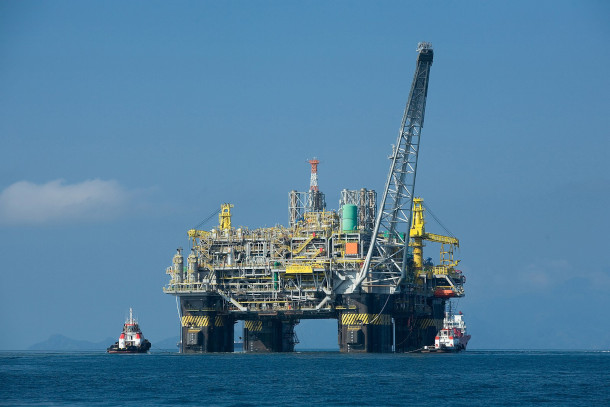
Despite its strong commitments to climate and rainforest protection, Brazil is aiming to become a large producer of offshore oil and even began oil drilling near the Amazon River for the first time a few weeks ago, just before the UN conference. Above, the first 100% Brazilian oil platform, the P-51, in January 2009. (Photo: Divulgação Petrobras, Wikimedia Commons, CC BY 3.0 BR)
MORGAN: Well, it's clear Brazil is struggling with the transition, as I would say, all countries are finding their way. On the one hand, numbers just came out that showed that 2023 there was a decrease of 11.6% of deforestation happening compared to the year before. This is a very positive development. But Brazil is also looking to explore oil and gas and those resources, and I think it needs, therefore, to be actually leaning more into its clean energy possibilities, which it has. And that's where this COP is so important, that oil and gas producing countries like Norway, like Canada, like Australia, like Brazil, that they all come together and say, we really mean it, that we're going to transition away from fossil fuels in a just way. And this is our roadmap for how we're going to get there, even if we know right now we're not going in the right direction.
CURWOOD: Now, the Paris Agreement required each participating country to make nationally determined contributions, NDCs, to reduce national emissions and curb climate disruption. What do you expect will change regarding these commitments in this year's COP? What commitments are being made? What commitments are you waiting on?

Another big theme at COP30 is supporting countries in moving towards a just energy transition. Jennifer Morgan says India is stepping up as a leader in this sector by meeting 50% of the country’s energy demands with renewables over the summer. Above, a solar thermal power plant in Rajasthan, India. (Photo: Bkwcreator, Wikimedia Commons, CC BY-SA 3.0)
MORGAN: Well, at this year's COP, every country was committed as part of the Paris Agreement to put forward every five years an updated, nationally determined contribution. Many of those have come in, I would expect that they're still coming in. You know, we are still waiting for a few but I think all eyes have been on China and its NDC, as they're called, because they are the largest emitter, where they've put forward, certainly a very stable NDC and economy wide, with all the greenhouse gasses, which is new and big, and saying they're, for the first time, committing to absolutely reduce their emissions, but the ambition is less than what actually most analysts say they're going to achieve. So it's an under, lowballing, I guess you would say, of its commitment. Where does India come in? We've seen recently, renewables has met over 50% of total electricity demands in July, on a day this year. They're moving in that direction, its own transition. Will they be ready to step forward? And then, of course, Saudi Arabia will be also interesting to watch. I just mention them because, on the one hand, what I observe is Saudi Arabia is diversifying its national economy and moving into solar. They are investing massively in solar domestically and also in Africa, but clearly has a big interest to continue to export its oil and gas.
CURWOOD: And by the way, the United States is not participating in this Conference of the Parties, it seems. What does that mean?
MORGAN: Formally, it means that in the Paris Agreement, there will be no one sitting behind the US flag. You know, you sit at a table. Everybody has their names of their countries ahead of them and speaks so there'll be no US voice negotiating around these different decisions that need to be moved forward at this COP, I think it's a great loss for the United States not to have a voice in negotiating not only the future of our stable climate, but also the framework for future markets and current markets, but it means that other countries will be making these decisions. And obviously there will be other voices there. I think that there are voices coming from governors and representatives and business certainly, but the federal government will be absent.
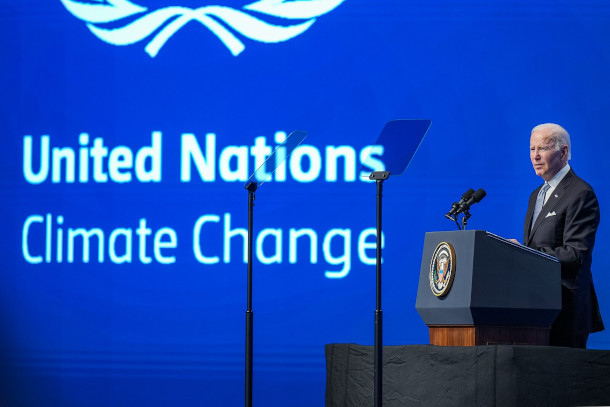
The United States, the largest historical emitter of greenhouse gases, will not have a federal representative at this year’s conference. Above, former President Biden pledged the U.S.’s commitment to climate at COP27 in Egypt. (Photo: White House, Wikimedia Commons, Public Domain)
CURWOOD: On a top line basis, what are the things that need to be decided at this Conference of the Parties, at COP30?
MORGAN: So it's a different kind of a COP, because there's not some big bang thing that's going to happen at five in the morning on the last day, but rather, there's a series of signals, decisions, and I would call them proof points, to demonstrate that they're accelerating action. So first of all, I think a very important decision is on adaptation, on how to build more resilient infrastructure, houses, food systems, to the impacts that are already happening. That, there's indicators, which is a very practical way of trying to see, okay, what needs to happen by when. And then, how is that going to be financed? More funding for that adaptation for the most vulnerable countries, that's a very important, for example, outcome for Africa. There will be a discussion on forests, of course, being in the Amazon, and there, I would say, signals of meeting that goal and accelerating around zero deforestation by 2030 that was set two years ago. But also, Brazil has put forward a Tropical Forest Forever Fund, a new financing mechanism for standing forests to avoid deforestation in the future. So which countries might sign up to that? How will that get financed? And then third, I would put forward the energy issue. Two years ago, countries decided to transition away from fossil fuels in a just, orderly, equitable fashion and triple renewables. They're not on track for that. There is a lot of progress on renewables. It still hasn't been tripled. So there are discussions, maybe there should be a roadmap of how to actually do that transition, where you have the different pathways being discussed, and then looking at what are the initiatives around grids, around storage that really can help overcome barriers so that that transition to renewables can accelerate.
CURWOOD: In the news, it's been Hurricane Melissa here in the Western Hemisphere, really shredding places like Jamaica and Cuba. And these smaller island states are very concerned about the climate crisis. What might we hear in terms of discussions about loss and damage in countries in the tropics, in the Global South, or how reparations might be made at this point?

In the wake of Hurricane Melissa, it’s clear that small island nations suffer the brunt of climate woes. One way these nations are planning to raise funds for climate reparations is through a levy on premium flight tickets and private jets. (Photo: Katsuhiko Tokunaga, Wikimedia Commons, CC BY-SA 2.0)
MORGAN: Well, loss and damage is something that small island nations fought for a fund for 30 years that was established a few years ago, and now it's really about providing funds for that loss and damage, response to loss and damage fund. So I would expect to hear pressure for pledges for that but also some new approaches. So, there is a group of countries that's going to be coming forward. They've already stated their intent on this, like France and Spain and Kenya and some small island nations, to put a solidarity levy on premium tickets, so first class, business class flights and private jets, and that group has said, we need a new, innovative way of funding loss and damage, also adaptation, because we know that public budgets are tight, and we also know that the numbers around these damages are just absolutely huge. So I would look out for that coalition, premium flyers group that's coming forward, and also other ideas on how actually to raise the money.
CURWOOD: Now, the UN Framework Convention on Climate Change operates under consensus, meaning that all participating parties must agree on terms before they can be applied. So to what extent does this rule of consensus make it difficult to reach climate goals, and what changes, if any, are being discussed along those lines?
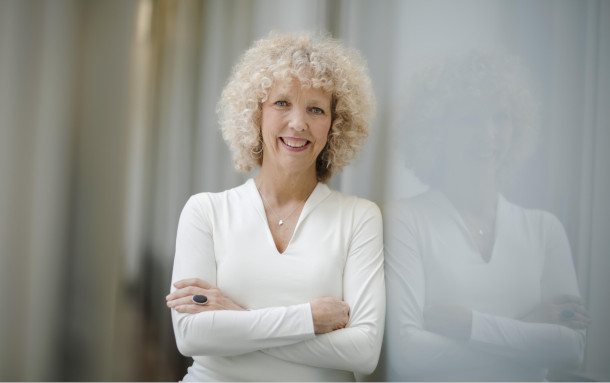
Jennifer Morgan is an American-German environmental activist specializing in climate change policy. From 2022 to 2025, she was the special representative for international climate policy of the Federal Foreign Office in Germany. From 2016 to 2022, Morgan co-led Greenpeace International. (Photo: Photothek)
MORGAN: Well, certainly having to have consensus of all countries together, on the one hand, is a good thing, because everybody has had to agree, but clearly it also enables those that want to move more slowly, to slow things down, whether it's on emission reductions or whether it's on finance. And I think that has made it more difficult, and this year, and I think moving into the future, there is a new discussion about reform of the process, with different ideas coming forward. And one that certainly has been raised by scientists and by even some countries, has been to revise what's called the rules of procedure, the voting rules at the climate meeting. I doubt that will be possible this year, that would be a multi-year effort. But I think it's important to be looking at how to make the UN Framework Convention more efficient. We need these multilateral approaches more than ever, and so finding ways of increasing their effectiveness is key.
CURWOOD: You've been going to these Conferences of the Parties, I guess it's COP30, you've been to 30 of them. How do you feel this year about this one?
MORGAN: I feel determined and worried, worried about the pace of change that's not fast enough, and determined to work with the thousands who will be there to accelerate that pace of change and not let one country that's trying to slow it down hold the rest of the world back.
CURWOOD: Jennifer Morgan is a climate activist, a former German diplomat on the climate, and former Executive Director of Greenpeace. Thank you so much for taking the time with us today.
MORGAN: Great to be with you.
Links
Living on Earth wants to hear from you!
Living on Earth
62 Calef Highway, Suite 212
Lee, NH 03861
Telephone: 617-287-4121
E-mail: comments@loe.org
Newsletter [Click here]
Donate to Living on Earth!
Living on Earth is an independent media program and relies entirely on contributions from listeners and institutions supporting public service. Please donate now to preserve an independent environmental voice.
NewsletterLiving on Earth offers a weekly delivery of the show's rundown to your mailbox. Sign up for our newsletter today!
 Sailors For The Sea: Be the change you want to sea.
Sailors For The Sea: Be the change you want to sea.
 The Grantham Foundation for the Protection of the Environment: Committed to protecting and improving the health of the global environment.
The Grantham Foundation for the Protection of the Environment: Committed to protecting and improving the health of the global environment.
 Contribute to Living on Earth and receive, as our gift to you, an archival print of one of Mark Seth Lender's extraordinary wildlife photographs. Follow the link to see Mark's current collection of photographs.
Contribute to Living on Earth and receive, as our gift to you, an archival print of one of Mark Seth Lender's extraordinary wildlife photographs. Follow the link to see Mark's current collection of photographs.
 Buy a signed copy of Mark Seth Lender's book Smeagull the Seagull & support Living on Earth
Buy a signed copy of Mark Seth Lender's book Smeagull the Seagull & support Living on Earth

